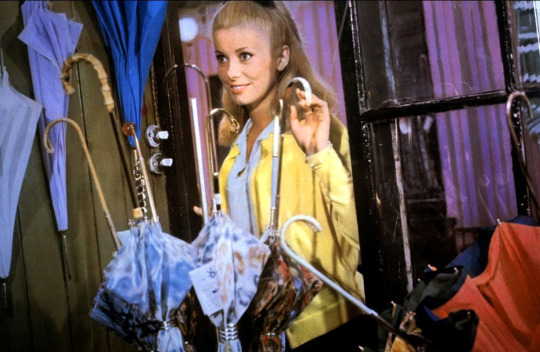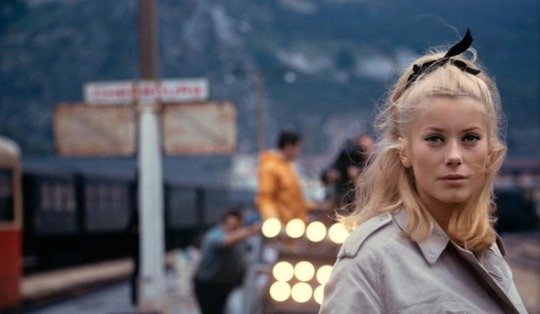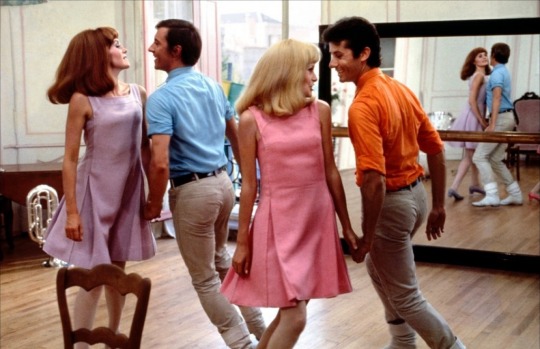What Happens to Love in Jacques Dmys The Umbrellas of Cherbourg and The Young Girls of RochefortBy Scott Tobias
By Yasmina Tawil

“Our life is a romance, a melody composed by chance.”
So sings one of the carnies who blow through town in Jacques Démy’s The Young Girls of Rochefort, putting the director’s thesis statement to music. Played by George Chakiris and Grover Dale, they’re the happiest characters in the film because they’re the only ones who don’t imagine a destiny greater than the next stop on the tour. For them, Rochefort is another town with another gallery of pretty women, and when they’re done cavorting in the streets—and hawking a brand-new Honda motorcycle at the fair—they’re on to new adventures, untroubled by the desire for some greater and more elusive destiny. The people they meet in Rochefort, by contrast, are constantly in search of some ideal love that’s out there somewhere—of that they are convinced and perhaps correct—but it can’t possibly be in this little town, which isn’t big enough to house their dreams. Perhaps it’s in Paris. Perhaps it’s on the other side of the world.
Both a part of and apart from his French New Wave brethren, Démy directed deceptively bright confections that carry themselves lightly, but are more troubled under the surface than they might appear. With 1964’s The Umbrellas of Cherbourg and 1967’s The Young Girls of Rochefort, Démy paid homage to the American movie musicals with much the same vigor as his contemporaries in the movement embraced and reconfigured American genre pictures. What comes through in both films is the purity of emotion that the musical affords: private desires expressed openly and vigorously, the joys of courtship, and love requited, popping off like starbursts in the choreography. The songs express a desire for love, but fate doesn’t guarantee its realization—and beyond that, there’s no certainty that one’s romantic ideal will last forever. Life is complicated. Circumstances intervene.
The Umbrellas of Cherbourg is perhaps my favorite movie of all time—deft, colorful, enchanting, and singular, with a beautiful cast singing beautiful music (by Michel Legrand) and the most exquisitely bittersweet ending I’ve ever seen, with its piercing insight into time, adulthood, and matters of the heart. Divided neatly into three parts, the film’s first third and final third offer two perfect windows into what happens to love when it gets caught up in the headwinds of fate. Every line of dialogue is sung, but the lyrics change color like leaves in passing seasons, resonating first with youthful optimism and later with twinges of regret and resignation. We watch as Geneviève (Catherine Deneuve), the impossibly beautiful 16-year-old daughter of an umbrella shop proprietor, falls in love with Guy (Nino Castelnuovo), an auto mechanic, and the two dream of marriage and children and the other gifts of a life without friction. Because that’s what young people do: they feel first love intensely and lack the experience to imagine the possibility that it won’t work out. When Guy gets drafted into the war in Algeria, their parting is the ultimate train-leaving-the-station heartbreaker (their repeated chorus of “mon amour” and “j’taime,” with the main theme swelling, is one for the ages), but they fully believe that they’ll resume their lives together when his tour of duty ends.

They don’t, of course, and that hard truth is what deepens the remainder of The Umbrellas of Cherbourg, which waves the “Happily Ever After” ending goodbye at the tracks and considers the reality that our first love is very rarely our last and that a person we love above all others could eventually become, if not a stranger, a distant memory. After Guy leaves, his letters from Geneviève taper off after a while, and when he finally comes back to that same station where she bid him adieu, there’s no one there waiting for him. This is a deflating moment, but even that passes, and Démy moves the film toward a denouement that finds Geneviève and Guy reunited as adults under much different circumstances—both with new partners and children, both fundamentally happy, both feeling wistful about their past together.
What has become of their love? The audience naturally asks this question, as they must in this moment, but Démy’s answer isn’t as despairing as we think. Geneviève and Guy no longer feel that intense connection that musicals associate with endless happiness, and we in the audience feel that loss acutely, because The Umbrellas of Cherbourg is only 91 minutes long. But time works a troubling kind of magic in this movie: The scope of their entire adult lives is compressed to where just an hour separates the height of their passion from their muted reunion in the end, but in actuality many years have passed and they’ve survived and moved on. If there’s any sad note in that ending, it’s that love probably doesn’t have the end-of-the-world intensity it did when they were young—it’s more stable and settled, a persistent warmth rather than a hot flame. Musicals don’t naturally accommodate such ambiguities, but Legrand’s theme keeps the end of the first act in conversation with the end of the last: love isn’t pure, but that’s okay.
At first glimpse, The Young Girls of Rochefort behaves as if The Umbrellas of Cherbourg never existed, which may be part of why it’s not as cherished as its predecessor. The native notion of romantic destiny thrives in this idyllic town, where people may not sing when they speak, but they dance in the streets in primary colored clothing. It’s easier to look at Rochefort as a more straightforward homage to Hollywood tradition, even before Gene Kelly turns up as a smitten American tourist. Démy nods to An American In Paris and West Side Story, and the entire film has the quality of an especially studious exercise in choreography—both in the architecture of the plotting, with its cascading stories of lonely hearts looking for the perfect partner, and in the song-and-dance, which is much more elaborate than Umbrellas in staging group numbers. At times, the entire locale seems like one organism, not unlike the flash mobs that have surfaced in viral videos.

While the giddiness and color of Rochefort never quite finds the melancholy shades of the previous film, the entire film devotes itself to dreamers who seek a better life that’s just out of their grasp. And not just out of their grasp but around the corner: Maxence (Jacques Perrin), a sailor who’s travelled to many ports with the navy, has literally painted a picture of his ideal love and it’s Delphine (Deneuve), a local dance instructor who teaches kids with her twin sister Solange (Françoise Dorléac), a pianist. Solange pines for Kelly’s character, with whom she crosses eyes after a tumble, but they can’t find each other. Neither can Michel Piccoli’s music shop owner, who doesn’t realize that his former fiancée and true love—Delphine and Solange’s mother, played by Danielle Darrieux—happens to run a café at the center of town. All three romantic pairs orbit around each other until the very end of the movie, which finally removes the invisible barriers of the plot that were keeping them apart.
We don’t see what happens once the three couples finally get together after so many missed connections, but Démy denies the outpouring of emotion that might be expected. There’s no triple wedding or any such fireworks, but a more offhand treatment, especially for Maxence, who hitches a ride in the same truck that Delphine is taking to Paris. Will they live happily ever after? The previous film suggests the answer—that no love, no matter how idealistic, is guaranteed to last—but Démy doesn’t trail uncertainty behind them quite as sharply as, say, the end of The Graduate, which came out the same year. Going back to that line, “Our life is a romance, a melody composed by chance,” both The Umbrellas of Cherbourg and The Young Girls of Rochefort are stirring affirmations of love, but to a degree it’s out of our hands what form it might take and when. Sometimes when it seems certain, it isn’t. Sometimes when it seems an impossible dream, it happens. Destiny has a part to play.

